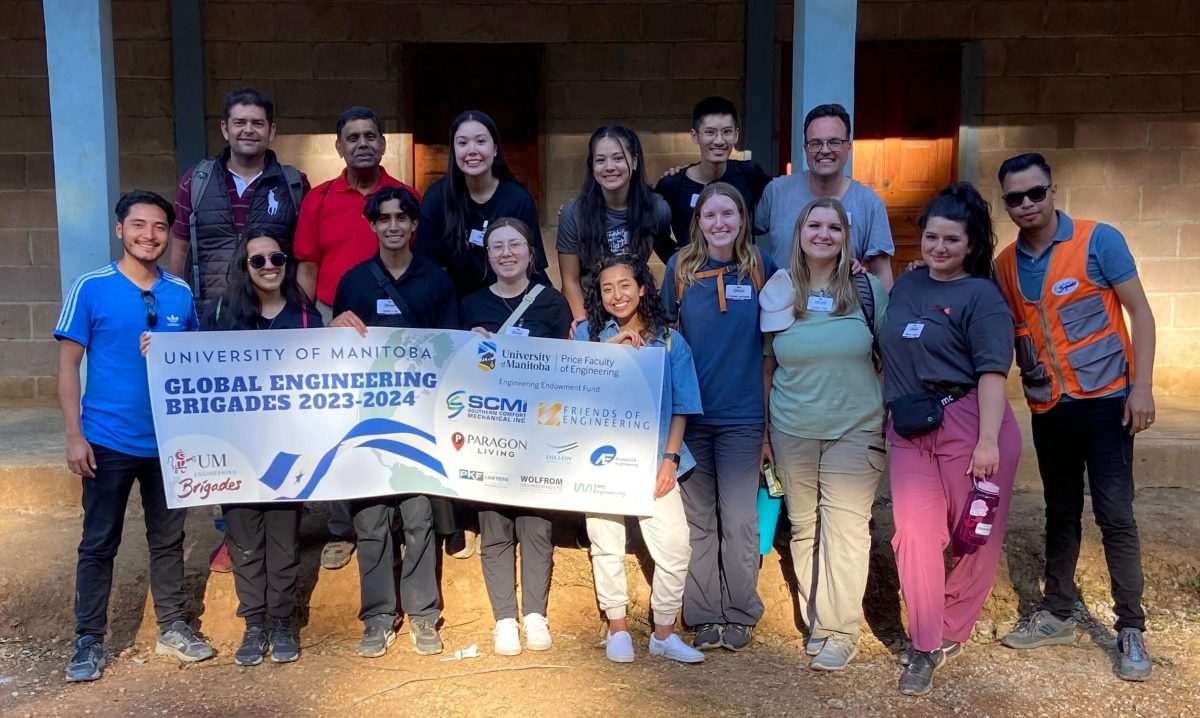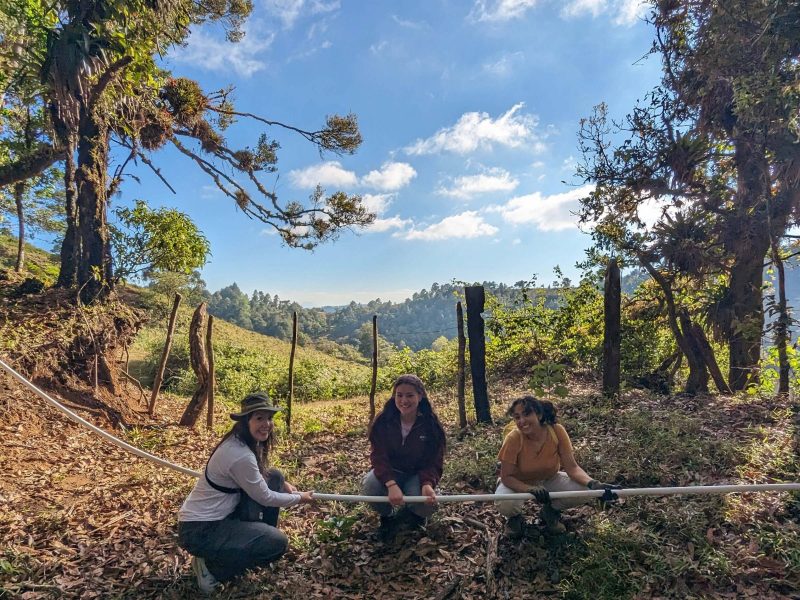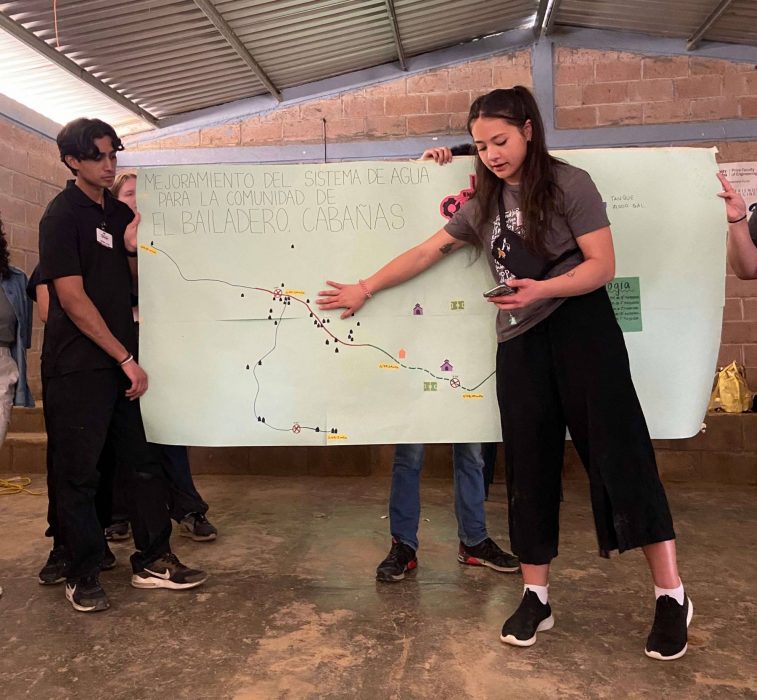
Top row (left to right): Marcos Landa, Dr. Ranjan R. Sri Ranjan, Izzy Marquez, Katryna Salm, Ryan Kum, Dr. Jason Morrison. Bottom row (left to right): Carlo Peña, Karisma Vyas, Joshua Ilyas, Annika Wolfe, Julissa Rodriquez, Katy Hawthorne, Karina Vasin, Fiorella Amenta, Lewis Blandón. Not pictured: Ethan Axdal and Anna Hawthorne
Students take on sustainable development projects in Honduras
University of Manitoba students engineer water solutions abroad
In February 2024, 12 University of Manitoba students made the most of their reading week by travelling to Honduras to gain real-world engineering and sustainable development experience. With the help of the non-profit organization Global Brigades, the team from the Price Faculty of Engineering used their skills to improve water access for two under-resourced rural communities in the department of La Paz.
Global Brigades is an international non-profit that implements a holistic approach to achieve community health and economic objectives. Funded entirely through the efforts of over 500 university chapters globally, they prioritize community involvement and sustainable outcomes. Global Brigades has a dedicated team of over 400 local staff members, who ensure programs are locally led and supported by government collaboration. Their approach empowers local leaders and aims for lasting impacts that meet the specific needs of each community they serve.
Biosystems Engineering Alumni, Ryan Kum and Karina Vasin, took initiative and facilitated the development of the University of Manitoba Global Engineering Brigades (UMGEB) chapter. The UMGEB project team was established under the engineering student team UMEarth, which focuses on sustainable projects and equipping students with skills, experiences and connections to excel in their careers. UMEarth, unlike other engineering teams, consists of multiple projects with a variety of goals each started by a student with a passion for sustainable development. UMGEB has now become a major focus for the UMEarth team, with most of its members participating in the project. Ryan, who had been dreaming of starting a brigade chapter at UM since before the pandemic, says he is so grateful the team was finally able to be established and glad that not only did everyone survive the trip but thrived through the whole process.
Motivated by a desire to see their education make an impact, the team set out to accomplish as much as possible for the community during the short one-week trip. Following the team’s formation in September 2023, members worked diligently hosting food and plant sales, gaining support from sponsors and collecting donations to make the trip possible. In the early fall, Ryan and Dr. Ranjan also began coordinating the projects with the Global Brigades team in Honduras who consisted of engineer, Marcos Landa, brigade coordinator, Daniella Ochoa, brigade leader, Lewis Blandón and translator, Carlos Peña.
“I was initially intrigued by the idea of going to Honduras to design water systems because it was an opportunity to gain hands on experience in my field of study. Although I acknowledge the importance of the courses we take in our program, I believe there are only so many engineering skills that can be acquired in a classroom setting.” Student, Karisma Vyas.

While in Honduras, the team worked on two projects which would provide water-poor communities with sufficient water for their daily needs. The first project of the engineering brigade took place in a small rural community called Montaña Verde. This community is at a higher elevation than their water source, forcing residents to complete daily treks up and down a steep hill to transport water for use. Due to its remote location, an electric pump was both impractical and costly. Months prior, Dr. Ranjan and Marcos Landa developed a system design that could deliver water uphill to the community without electric power. The students spent a day installing and gluing the piping over a 500m distance. Considering the piping route consisted of uneven surfaces, the group had to exercise caution while navigating the rugged terrain. The locals were instrumental in assisting the team throughout the entire process. Whenever the path proved difficult to access, they would step in, ensuring the group’s safety at all times. In addition to the piping, a hydraulic ram pump was assembled, which uses a combination of valves and water pressure to pump water without electrical power. Dr. Ranjan trained four local plumbers on the operation of the water system and how to start up the hydraulic ram pump for continuous operation. This concept was initially met with skepticism by community leaders, as similar technology had never been introduced in the area. However, the Global Brigades team hopes this project’s success can be replicated in other communities that face similar challenges to water access.
The second project took place in a rural community of 134 homes called El Bailadero. This community had an existing water system, however it failed to meet their current needs due to population growth and a decreasing water supply from changing climate conditions. The goal of this project was to design a distribution system that would incorporate a new additional water source, increasing its capacity for current and future needs. The first stage consisted of information gathering. Led by volunteers from the community itself, the students conducted community needs surveys, GPS surveying and mapping to learn more about the water and sanitation requirements of the people, and the challenges in meeting these needs. Many of the students were initially concerned about conducting the community surveys as there were only a few Spanish-speaking members on the team. However, the community members were very welcoming and kind, opening their homes to the students and listening to what little Spanish the they had been able to learn. The Brigade staff, notably Carlos, aided tremendously in helping the team communicate and taught them all quite a bit of Spanish and Honduras slang throughout the duration of the trip.

During the design stage, the information data was compiled into a design software to propose a system that would be both functional and cost-effective. Once the design was finalized, the team headed to the El Bailadero Community Hall to present the proposed design of the water delivery system to the community. The meeting started with a prayer by an Elder followed by the national anthems of Honduras and Canada. The President of the local Water Council presented the history of the community, giving insight into what the project meant for them. The team then shared the proposed system design with the community leaders and members, receiving an overwhelmingly positive response.
This trip to Honduras not only enriched the students’ practical engineering skills, but it also reinforced a wider commitment to use engineering for sustainable development. Team lead, Karina, spoke on how the brigade enhanced her engineering education saying, “I am grateful for the opportunity to have worked in a rural part of Honduras. I gained invaluable engineering experience while improving local water systems. Collaborating with the local engineers and water council within the community, I learned lessons that transcended textbooks. Additionally, witnessing the impact of our efforts and seeing all the joyful faces was beyond rewarding. This experience not only enhanced my technical skills but also highlighted the importance of sustainable development and community involvement, inspiring me to continue pursuing positive change through engineering”. The UMGEB team hopes that this is the beginning of a long-lasting relationship between the University of Manitoba and Global Brigades and is currently planning a return brigade in February 2025 with six returning students and two returning professors. The team is hoping to recruit six new eager student members who are also hard-working and passionate about sustainable development. The team would like to extend their ever-present gratitude to their generous sponsors and faculty support who choose to invest in future young professionals.
To stay up to date on what the teams are doing, follow their Instagram account @UMEarth and @UMGEB.






